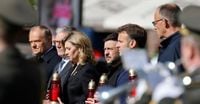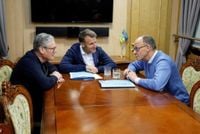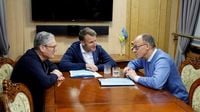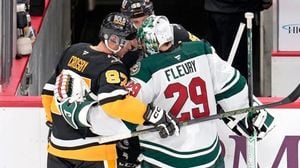On May 10, 2025, a historic gathering of European leaders took place in Kiev, as French President Emmanuel Macron, British Prime Minister Keir Starmer, German Chancellor Friedrich Merz, and Polish Prime Minister Donald Tusk met with Ukrainian President Volodymyr Zelensky. This unprecedented joint visit marked the first time the leaders of the four major European nations have traveled together to Ukraine, symbolizing unwavering support for the country amid its ongoing conflict with Russia.
The primary objective of this diplomatic mission was to urge Russia to agree to an unconditional 30-day ceasefire. In a joint statement released prior to their arrival, the leaders emphasized the need for an immediate cessation of hostilities to create space for peace negotiations. "Together with the United States, we call on Russia to agree to a complete and unconditional ceasefire of 30 days to create space for talks on a just and lasting peace," they stated.
Macron, Starmer, Merz, and Tusk reiterated their commitment to increasing support for Ukraine, stating, "We will continue to increase our support for Ukraine. We will step up pressure on the Russian war machine until Moscow accepts a lasting ceasefire." This declaration comes at a critical time, as the war in Ukraine has now reached its 1,172nd day, with the situation on the ground becoming increasingly tense.
The visit coincided with heightened military activities and a recent warning from the U.S. embassy in Kiev about a potential large-scale air attack against Ukraine. The embassy urged American citizens in the country to remain vigilant, indicating that significant military actions could occur in the coming days.
During the visit, the European leaders participated in a virtual summit with President Zelensky and other representatives of the so-called "coalition of the willing," a group of Western nations primarily from Europe ready to offer security guarantees to Ukraine. The summit aimed to update coalition members on the progress made toward forming a future coalition capable of uniting air, land, and naval forces to support the regeneration of the Ukrainian army in anticipation of a peace agreement and long-term stability.
Macron expressed the urgency of the situation, stating in an interview with Polish television, "My hope is that in the coming hours and days we can find an agreement between the United States and Europe for a 30-day ceasefire. And if the agreement is violated, heavy economic sanctions will follow." He emphasized that Russia must agree to a genuine ceasefire, rather than using the time to prepare for further military actions.
The European initiative comes just a day after a military parade in Moscow commemorating the 80th anniversary of the victory over Nazism, a significant event that carries propaganda weight for the Kremlin. In stark contrast, the leaders in Kiev are calling for an end to bloodshed, urging Russia to halt its illegal invasion and allowing Ukraine to thrive as a secure, protected, and sovereign nation within its internationally recognized borders.
In a related development, Kremlin spokesperson Dmitry Peskov stated that the supply of weapons to Ukraine by its allies must cease before Russia would consider agreeing to a ceasefire. He described a truce as a potential "advantage for Ukraine" at a time when Russian forces are reportedly advancing on the front lines.
As the European leaders continue their discussions with Zelensky, they are also negotiating with U.S. officials to finalize a more binding ceasefire proposal for Russia. The urgency of this diplomatic mission reflects the ongoing complexities of the conflict, with both sides entrenched in their positions.
Meanwhile, President Zelensky communicated with former U.S. President Donald Trump, informing him that the Ukrainian parliament had approved an agreement on rare minerals, a move that could have significant implications for Ukraine's economic future. The White House described the call as "very productive," highlighting the ongoing collaboration between Ukraine and its allies.
As the situation unfolds, the leaders' visit represents a critical moment in the ongoing conflict, emphasizing the need for unity and decisive action in the face of adversity. The stakes are high, and the world watches closely as these European leaders advocate for peace while standing firm against aggression.
The outcome of this diplomatic effort remains uncertain, but the commitment shown by Macron, Starmer, Merz, and Tusk signals a concerted effort to bring about a resolution to the conflict and to support Ukraine in its quest for sovereignty and stability.






